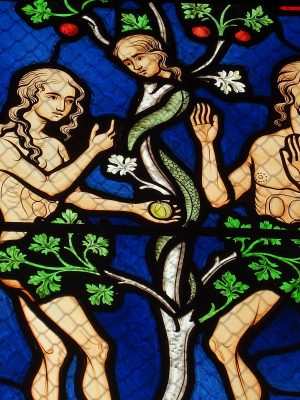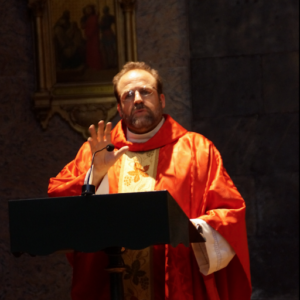Why are so many on the road to destruction and so few on the road to salvation? In this excerpt taken from The Hell There Is, Msgr. Charles Pope walks through various reasons why mankind is so prone to rebellion and destruction.
We Have Concupiscence
Prior to the effects of original sin, it is taught (e.g., Council of Trent, Denzinger 3514, 1926) that Adam and Eve had the preternatural gift of “integrity.” That is, their human appetites and desires were completely submitted to the intellect. They had authority over passions, feelings, and desires. This is why their sin in the garden is so puzzling and serious.
After the Fall ushered in original sin, things were turned upside down. The passions became unruly and demanded unreasonable attention and fulfillment. This state of excessive and irrational desires is called concupiscence. In effect, we are besieged with desires of the lower appetite contrary to reason. Because of original and personal sin, the subordination of our reason to God is damaged, and we begin to lose our sense of the supreme good and our ultimate end. If we do not discipline ourselves, the lower appetites become increasingly unrestrained, and we permit them to take control. This leads, as we can see often in ourselves and in the wider culture, to the pursuit of sensuous gratifications independent of what is reasonable. Our higher faculties become subordinated to the drives of our lower nature. We become prone to a kind of “emotional reasoning” and true reason fades away. Concupiscence pressures the will to consent and, by increasing degrees, hinders reason from considering the lawfulness or unlawfulness of moral acts. However, this does not mean that human reason and will are wholly damaged or unable to resist such desires, even though its freedom and dominion are to some extent diminished. In fact, through grace and the practice of virtue, our will can resist temptation, while vices can be mastered. Though it is a battle, the Lord mercifully offers His law, teaching, and sufficient graces to us so that, as Scripture says, where sin abounds, grace abounds all the more (see Rom 5:20; 2 Cor 12:9).
Our “Flesh” Is Opposed to Our Spirit
In every human being, there exists a spiritual nature that is open to goodness, beauty, and truth; it is a part of us that seeks God and the highest things associated with Him. But opposed to this is another deep drive that St. Paul calls “the flesh” (sarx, in Greek). The flesh is not to be understood simply as the body. More accurately, it is an attitude of rebellion and a deep preference for the lower things of this earth, such as wealth, power, popularity, and, yes, the inordinate desires of the body. The flesh does not want to be told what to do; it rebels against limits and thus opposes the teachings of God and His Church. Heaven and spiritual things are a bore to the flesh; its preoccupation is with worldly and trendy things, anything but God and the things of God. St. Thomas Aquinas mentions this slothful attitude of the flesh in the Summa and concludes, on account of it: “Those who are saved are in the minority.” (Pars Prima Q. 23.7 ad 3). The flesh indulges pride and resists what is reasonable and true. St. Paul identified the bad fruits of the flesh explicitly: “Now the works of the flesh are evident: sexual immorality, impurity, sensuality, idolatry, sorcery, enmity, strife, jealousy, fits of anger, rivalries, dissensions, divisions, envy, drunkenness, orgies, and things like these” (Gal 5:19–21).
We Have Hard Hearts and Stubborn Wills
Surely these flow from the flesh and from concupiscence. But it deserves to be highlighted as a very common disposition in the human family. God, speaking to us through Isaiah the prophet, said, “I know that you are obstinate, and your neck is an iron sinew and your forehead is bronze” (Is 48:4). Note, he is talking about us and how easily defiant we can be!
We Don’t Like to Be Told What to Do
We bristle at correction. Even if we know a correction is needed and true, that we ought to do something or to stop doing something, the mere fact that someone is telling us often makes us dig in our heels and refuse. And if we comply, we often do so resentfully rather than wholeheartedly.
We Are Not Docile
To be docile means to be teachable. When we were very young, we were fascinated with the world around us and kept asking, “Why, Mommy?” or “Why, Daddy?” As we got older, our skull thickened. We stopped asking why. We figured we knew better than anyone around us. The problem just worsens with age unless grace intervenes. St. Paul lamented, “For the time will come when people will not endure sound doctrine; but wanting to have their ears tickled, they will accumulate for themselves teachers in accordance to their own desires, and will turn away their ears from the truth and will turn aside to myths” (2 Tm 4:3–5).
We Love Distraction and Don’t Listen
Even when saving knowledge is offered to us, we are too often tuned out, distracted, and unwilling to hear it. Attention deficit disorder is nothing new in the human family. God said through Jeremiah, “To whom shall I speak and give warning, that they may hear? Behold, their ears are uncircumcised, they cannot listen; behold, the word of the LORD is to them an object of scorn; they take no plea- sure in it” (Jer 6:10). Note that this text speaks not only of distraction but of a willful distraction. We are often distracted because we want to be distracted. Sitting quietly and listening carefully to the Lord is, in some sense, terrifying. So, instead, we seek out YouTube videos or lose ourselves in social media. Jesus invoked Isaiah to explain why He spoke to the crowds only in parables: “For this people’s heart has grown dull, and with their ears they can barely hear, and their eyes they have closed” (Is 6:10).
ooo
This article is taken from a chapter in The Hell There Is: An Exploration of an Often-Rejected Doctrine of the Church by Msgr. Charles Pope which is available from TAN Books.









